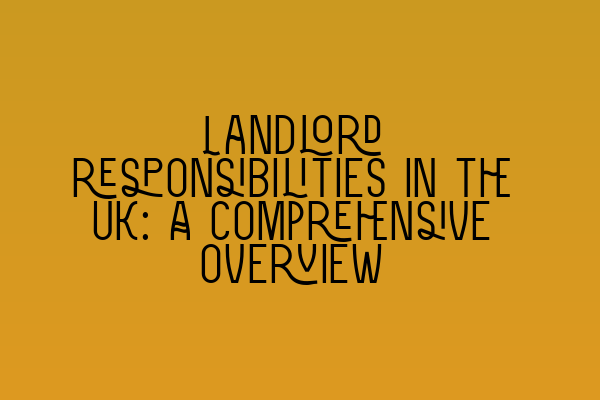Landlord Responsibilities in the UK: A Comprehensive Overview
Welcome to SQE Property Law & Land Law, where we provide expert legal advice and guidance on various property-related matters. In this blog post, we will be discussing landlord responsibilities in the UK, offering you a comprehensive overview of what it means to be a landlord and the legal obligations that come with it.
Being a landlord entails not only owning a property but also assuming certain responsibilities towards your tenants. It is essential to be aware of these responsibilities to maintain a healthy and lawful tenancy relationship. Failure to fulfill these obligations can result in legal implications and potential financial losses.
Maintaining the Property
One of the primary responsibilities of a landlord is to ensure the property is safe and habitable for tenants. This includes conducting regular maintenance and repairs to keep the property in good condition. Landlords must make sure that the property meets all relevant health and safety standards and comply with regulations such as gas and electrical safety.
When renting out a property, it is crucial to conduct a thorough inspection to identify any potential hazards or issues. Taking necessary measures to address these problems before the tenants move in is paramount. Regular inspections throughout the tenancy period are also recommended to promptly address any maintenance concerns.
Providing Essential Services
As a landlord, you are responsible for providing essential services to your tenants. This includes ensuring the property has a reliable water supply, proper sanitation facilities, and a functioning heating system. It is important to keep these services in good working order and respond promptly to any issues that arise.
Furthermore, landlords are expected to maintain the property’s exterior, such as the garden and communal areas, if applicable. This can involve regular gardening, cleaning, and waste management to ensure a safe and pleasant living environment for tenants.
Renting Legally
It is crucial for landlords to understand and adhere to the legal requirements involved in renting out a property. This includes ensuring proper documentation and compliance with relevant legislation.
Before renting out a property, landlords should provide tenants with a written tenancy agreement that outlines the terms and conditions of the tenancy. This agreement should include details such as the length of the tenancy, rent payment terms, and any additional responsibilities or restrictions.
Additionally, landlords must protect their tenants’ deposits in a government-approved deposit protection scheme. Failure to do so can lead to severe penalties.
Complying with the law is not limited to tenancy agreements and deposit protection. Landlords must also consider other legislation, such as the Equality Act 2010, which prohibits discrimination when selecting tenants. It is essential to treat all potential tenants fairly and without bias.
Tenant Communication and Privacy
Establishing effective communication with your tenants is key in maintaining a positive landlord-tenant relationship. Clear and open lines of communication enable tenants to raise concerns or report any issues promptly.
Respecting your tenants’ privacy is equally important. While you have the right to enter the property for essential inspections or repairs, you must provide sufficient notice and obtain the tenant’s consent. It is essential to strike a balance between conducting necessary property inspections and respecting your tenants’ right to privacy.
Ending a Tenancy
When a tenancy comes to an end, landlords must follow the proper legal procedures. This includes providing adequate notice to tenants and conducting a thorough check-out inspection. Return of the tenant’s deposit should be done promptly and in compliance with deposit protection schemes.
Additionally, if a landlord wishes to regain possession of their property, they must follow the appropriate eviction procedures based on the type of tenancy. It is imperative to seek legal advice and ensure that all necessary steps are taken to avoid legal repercussions.
Conclusion
Being a landlord in the UK comes with various responsibilities that are crucial to maintain a healthy and legal tenancy relationship. From property maintenance and essential services to legal obligations and tenant communication, each aspect requires careful attention.
If you need further guidance or legal assistance regarding landlord responsibilities or any other property law matters, our team of expert solicitors at SQE Property Law & Land Law is here to help.
Related Articles:
